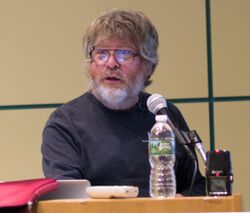Biography:Russell Impagliazzo
Russell Graham Impagliazzo | |
|---|---|
 Russell Impagliazzo at the DIMACS Workshop on Cryptography, July 2016. | |
| Alma mater | Wesleyan University; University of California, Berkeley |
| Known for | Results in computational complexity theory |
| Scientific career | |
| Thesis | Pseudo-random Generators for Probablistic Algorithms and for Cryptography (1992) |
| Doctoral advisor | Manuel Blum |
| Website | https://cseweb.ucsd.edu//~russell/ |
Russell Graham Impagliazzo[1] is a professor of computer science at the University of California, San Diego, specializing in computational complexity theory.[2]
Education
Impagliazzo received a BA in mathematics from Wesleyan University.[3] He obtained a doctorate from the University of California, Berkeley in 1992. His advisor was Manuel Blum.[1] He joined the faculty of UCSD in 1989,[4] having been a postdoc there from 1989 to 1991.[3]
Contributions
Impagliazzo's contributions to complexity theory include:
- the construction of a pseudorandom number generator from any one-way function,[5]
- his proof of Yao's XOR lemma via "hard core sets",[6]
- his proof of the exponential size lower bound for constant-depth Hilbert proofs of the pigeonhole principle,[7]
- his work on connections between computational hardness and de-randomization,[8][9][10][11]
- and his work on the construction of multi-source seedless extractors.[12]
- stating the exponential time hypothesis that 3-SAT cannot be solved in subexponential time in the number of variables,[13] This hypothesis is used to deduce lower bounds on algorithms in computer science.[14][15]
Five worlds of complexity theory
Impagliazzo is well-known for proposing the "five worlds" of computational complexity theory, reflecting possible states of the world around the P versus NP problem.[16]
- Algorithmica: P = NP;
- Heuristica: P is not NP, but NP problems are tractable on average;
- Pessiland: there are NP problems that are hard on average, but no one-way functions;
- Minicrypt: one-way functions exist, but public-key cryptography does not;
- Cryptomania: public-key cryptography exists.
Understanding which world we live in is still a key motivating question in complexity theory and cryptography.[17]
Awards
Impagliazzo has received the following awards:
- Best Paper Award from the Computational Complexity Conference[3]
- 2003 Outstanding Paper Award from the Society for Industrial and Applied Mathematics[4]
- 2003 Best Paper Award at the Symposium on Theory of Computing[4]
- named a 2004 Guggenheim fellow for work on "heuristics, proof complexity, and algorithmic techniques"[4]
References
- ↑ 1.0 1.1 "Russell Impagliazzo - The Mathematics Genealogy Project". https://mathgenealogy.org/id.php?id=31474.
- ↑ "Russell Impagliazzo's". https://cseweb.ucsd.edu//~russell/.
- ↑ 3.0 3.1 3.2 "Russell Impagliazzo | Simons Institute for the Theory of Computing". https://simons.berkeley.edu/people/russell-impagliazzo.
- ↑ 4.0 4.1 4.2 4.3 "Faculty Profile | Jacobs School of Engineering". https://jacobsschool.ucsd.edu/faculty/profile?id=112.
- ↑ HÅstad, Johan; Impagliazzo, Russell; Levin, Leonid A.; Luby, Michael (1999). "A Pseudorandom Generator from any One-way Function". SIAM Journal on Computing 28 (4): 1364–1396. doi:10.1137/S0097539793244708. ISSN 0097-5397. http://crypto.cs.mcgill.ca/~crepeau/COMP647/2007/TOPIC06/HILL.PDF.
- ↑ Impagliazzo, Russell (1995). "Proceedings of IEEE 36th Annual Foundations of Computer Science". Proceedings of IEEE 36th Annual Foundations of Computer Science. pp. 538–545. doi:10.1109/SFCS.1995.492584. ISBN 0-8186-7183-1.
- ↑ Beame, Paul; Impagliazzo, Russell; Krajíček, Jan; Pitassi, Toniann; Pudlák, Pavel (1996). "Lower Bounds on Hilbert's Nullstellensatz and Propositional Proofs" (in en). Proceedings of the London Mathematical Society s3-73 (1): 1–26. doi:10.1112/plms/s3-73.1.1. ISSN 1460-244X. https://londmathsoc.onlinelibrary.wiley.com/doi/abs/10.1112/plms/s3-73.1.1.
- ↑ Kabanets, Valentine; Impagliazzo, Russell (2004-12-01). "Derandomizing Polynomial Identity Tests Means Proving Circuit Lower Bounds" (in en). Computational Complexity 13 (1): 1–46. doi:10.1007/s00037-004-0182-6. ISSN 1420-8954. https://doi.org/10.1007/s00037-004-0182-6.
- ↑ Impagliazzo, Russell; Wigderson, Avi (1997-05-04). "P = BPP if E requires exponential circuits". Proceedings of the twenty-ninth annual ACM symposium on Theory of computing - STOC '97. El Paso, Texas, USA: Association for Computing Machinery. pp. 220–229. doi:10.1145/258533.258590. ISBN 978-0-89791-888-6. https://doi.org/10.1145/258533.258590.
- ↑ Impagliazzo, Russell (2003-04-28). "Hardness as randomness: a survey of universal derandomization". arXiv:cs/0304040.
- ↑ Carmosino, Marco L.; Impagliazzo, Russell; Kabanets, Valentine; Kolokolova, Antonina (2015). Garg, Naveen; Jansen, Klaus; Rao, Anup et al.. eds. "Tighter Connections between Derandomization and Circuit Lower Bounds". Approximation, Randomization, and Combinatorial Optimization. Algorithms and Techniques (APPROX/RANDOM 2015). Leibniz International Proceedings in Informatics (LIPIcs) (Dagstuhl, Germany: Schloss Dagstuhl–Leibniz-Zentrum fuer Informatik) 40: 645–658. doi:10.4230/LIPIcs.APPROX-RANDOM.2015.645. ISBN 978-3-939897-89-7. http://drops.dagstuhl.de/opus/volltexte/2015/5328.
- ↑ Barak, B.; Impagliazzo, R.; Wigderson, A. (2004). "Extracting Randomness Using Few Independent Sources". 45th Annual IEEE Symposium on Foundations of Computer Science. pp. 384–393. doi:10.1109/FOCS.2004.29. ISBN 0-7695-2228-9. https://ieeexplore.ieee.org/document/1366258.
- ↑ Impagliazzo, Russell; Paturi, Ramamohan (2001-03-01). "On the Complexity of k-SAT" (in en). Journal of Computer and System Sciences 62 (2): 367–375. doi:10.1006/jcss.2000.1727. ISSN 0022-0000. https://www.sciencedirect.com/science/article/pii/S0022000000917276.
- ↑ Lokshtanov, Daniel; Marx, Dániel; Saurabh, Saket (October 2011). "Lower Bounds based on the Exponential Time Hypothesis". Bulletin of the EATCS: 41–71.
- ↑ Williams, Virginia V. (2015). "Hardness of Easy Problems: Basing Hardness on Popular Conjectures such as the Strong Exponential Time Hypothesis". 10th International Symposium on Parameterized and Exact Computation. pp. 17–29. doi:10.4230/LIPIcs.IPEC.2015.17. https://drops.dagstuhl.de/opus/volltexte/2015/5568/pdf/5.pdf.
- ↑ Impagliazzo, Russell (April 17, 1995). "A Personal View of Average-Case Complexity". http://cseweb.ucsd.edu/users/russell/average.ps.
- ↑ Klarreich, Erica (April 18, 2022). "Which Computational Universe Do We Live In?". https://www.quantamagazine.org/which-computational-universe-do-we-live-in-20220418/.
External links
 |

